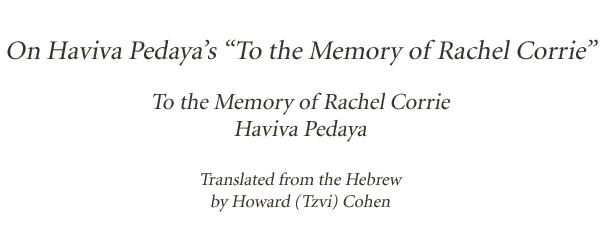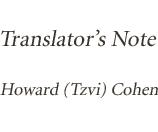|
r e c o m m e n d e d r e a d i n g |
h a v iv a p e d a y a |

|
When a digger approaches the earth is upturned piling up into piles When you stand before it mounds of earth drag you downwards And you fall When you climb to the top of the mound, you must climb to the top of the mound Balancing at the edge of the digger’s palm
And there remain a few moments for you to jump aside To flee to escape
To continue to scream from the side
When crushed the question arises: will the digger stop Allowing the body to be pulled out from beneath For if the digger moves back and then it moves forth Its palm may injure once more
When a bulldozer approaches the earth is upturned When a bulldozer approaches with intent to destroy The earth has no wish to hear it speak out in Hebrew calling itself a digger
Ay! This earth dissolving in the hand of the potter the plougher the sower
Thrust and dig thrust and dig Into the mouth of the pit Into the mouth of the pit
Touching the side of the palm Crying out over the face of the earth Enough of this thrusting into the house Enough of this digging into the midst of life
Thrust and dig thrust and dig Fallen into the pit fallen into the pit
Ay! The house Ay! The entrails of life
Thrust and dig thrust and dig drunken bull When a bulldozer approaches with intent to destroy The earth with her memory of Hebrew repels the words telling of the digger’s palm A hollow palm Did the Jews eat out of hollow palms and what do we know of the word palm
The earth digs into her memory searching for the word and comes up with the hollow palm of a sling There where the souls of the enemies were slung out as out of the hollow palm of a sling The enemies wandering between the world’s extremes Projected like stones from a sling Into an incessant unrest While the beloved are bound in the bundle of life
But what can we say now that the world is other
With the entrails of the earth upturned she longs to spew out To spew out the lives of those swallowed before their time
But the blood now flows
And so she tries to spew out these unfamiliar words Unknown from her two thousand years of an exile’s sleep
And when with a supreme force she tries to sound her sorrow for Rachel The sacred stones are exhumed Precious stones sparkling stones Stones of life stones of precision words
Thrust and dig thrust and dig drunken bull Your sister standing in the inner court to stop you Touching the side of the palm Thrust and dig thrust and dig
Your sister her voice of blood Thrust and dig cries out Thrust and dig from within Thrust and dig the earth
© Haviva Pedaya. Translation © Howard (Tzvi) Cohen The translation of poetry may perhaps be compared to the alchemist’s attempt to transmute elements. Both are involved in an artform trying to create a new substance in defiance of an hermetic and unique logic holding together the original; the translator, however, is faced with an additional hurdle – for not only must the translated piece appear as autonomous in its own right, it must, at the same time, remain faithful to its origins. Naturally, his task is impossible, and it is being aware of this impossibility which drives the translator forward in his mission. This awareness has also led to the following important note to the reader. As with almost all the poems of Professor Haviva Pedaya, the plaintive content is linked, at a deeper level, to the plaint of the Hebrew language itself – a language crying out as a result of its enforced occupation. To engage fully with the present poem, one must, therefore, be aware of the parallel being made between the imposition of modern Zionist ideals subjugating a land and a people [the Palestinians] and its enforced manipulation of the sacred language associated with this land. The following words within the Hebrew poem demonstrate this parallel oppression and are referred to here in order to allow for a fuller engagement with the English translation. Dahpur is a modern-day Hebrew word for “bulldozer,” and has been translated as “digger”. It is a hybrid, artificially formed from the words lidhof, meaning “to thrust”, and lahpur, meaning “to dig”. In Hebrew, there also exists the transliterated word “bulldozer”, and the poem oscillates between “digger” and “bulldozer” with dramatic and ironic effect. Rachel Corrie was crushed to death during the week of the Jewish holiday of “Purim” which celebrates the Scroll of Esther from the Bible. Esther saved the Jews from certain destruction, after the Pur, a biblical word meaning “lot”, was cast for them to be destroyed. The poem employs a play on words between this pur meaning “lot” and the pur present in the modern-day dahpur, thus revealing the imprisonment of sacred (biblical) words under the aegis of the conquering spirit. Unfortunately, it has not been possible to include this play on words in the English translation. Another word that is necessary to mention is cuf. Meaning spoon, it appears in the bible in reference to the sacrificial offering in the temple of Jerusalem, where fragrant incense was carried in golden spoons onto the alter. It also has the meaning “palm”, and appears in the bible in the context of the high priest anointing his palm with oils to purify himself before the Lord. Its use as “palm” in the poem, at one point alludes to the exiled Jew in the East (who ate his rice not with a spoon but from out of his cupped palm). Like so many other words, however, cuf has also been sequestrated for utilitarian purposes, and it is employed in modern Hebrew to describe the front of a bulldozer. Thus, Cuf hadahpur has been translated in the poem as “palm of the bulldozer”, thereby revealing the enforced subjugation of this biblical word within the context of the aggressor. In light of the above, one can understand why the traumatized land wishes to “spew out” this corrupted idiom and to return to a time, 2000 years ago, before the exile of the Jews by the Romans from the Land of Israel, and before the spirit of modern-day Zionism came into being. In searching through its memory, the land comes across the biblical expression cuf hakelah (Samuel 1, 25; verse 29) translated here as “the palm of a sling.” The land has returned to a time which is other, a time when the pious David (the poet of psalms) was alive and so too was the sanctity of the Hebrew language. In this poem, therefore, one can feel that on the symbolic level, Rachel’s brutal death instigates a reaction, a movement, whereby the land, in soaking up her blood, is transformed by it. The resulting awareness of its present sickness causes the land to try to spew out the effects of this modern-day oppressor and so cure itself. But the only recourse available under the circumstances is to take refuge in a past of uncontaminated presence – an act emphasizing the absence of a future under the destructive force of the present.
© 2003 Howard (Tzvi) Cohen
|
